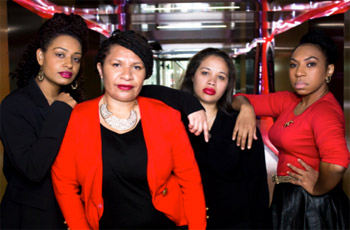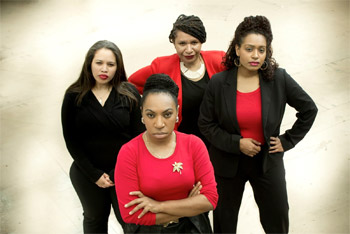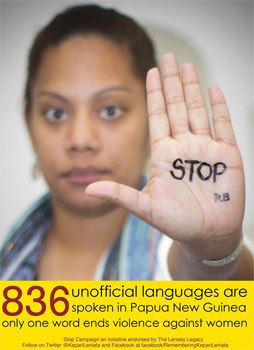Gertrude Sios and Cassaundra Rangip The Leniata Legacy Interview

Gertrude Sios and Cassaundra Rangip The Leniata Legacy Interview
Neighbouring Australia- a country where gender equality is the norm- the women of Papua New Guinea are subjected to gender-based brutalities. Advocating the enhancement of status and treatment of women in Papua New Guinea, The Leniata Legacy is dedicated to ensuring a brighter future for these women.
On 6th of February 2013, Kepari Leniata, a 20-year-old wife and mother of two, was publicly stripped naked, tortured and mutilated before her hands and feet were tied to planks. She was carried unconscious by a drunken mob to a pile of tyres covered in petrol where she was burned alive.
Kepari Leniata became one of the 70 percent of women in PNG who are raped or physically assaulted in their lifetime and it is from this horrific occurrence that The Leniata Legacy was established.
Founded by four women living in Brisbane, with Papua New Guinean heritage, these educated women strive to raise this awareness on an international platform through The Leniata Legacy, a non-for-profitorganisation fighting to eliminate these atrocities.
A recent study found that two-thirds of all families in PNG suffer -severe brutality' with violence, including savage attacks involving knives, axes and whips. The large degree to which these disgusting and inhumane acts are occurring has allowed for far too many cultural justifications, such as the phrase -ol meri big maus tumas' Referring to the idea that there is -too much talk' from women, this expression lends itself to the idea that a woman's issues do not have importance and are simply a lot of -noise'.
-Violence has become inherent in resolving disputes and these women constitute part of our -forgotten' society that make up the majority,' explained Brisbane based, PNG raised co-founder Cassaundra Rangip, -The women of Papua New Guinea not only face the national problems of poverty-stricken country; they are also subject to severe brutality with violence.'
The Leniata Legacy has been successful in raising further awareness of gender-based cruelties within PNG with The Baruni Project and The Resolution Conference, which united likeminded individuals and organisations to collectively resolve this issue.
The Baruni Project was developed based on the United Nations Population Fund Empowerment Program, where The Leniata Legacy presented modules at The Baruni Community School aimed at teaching women leadership skills, self-confidence, self-esteem and personal hygiene. The first of its kind in the country, The Leniata Legacy intends to run many programs like this, encouraging local community involvement and empower young girls to make a change.
Staged at the University of PNG in late August, The Resolution Conference saw The Leniata Legacy invite organisations and individuals to discuss issues, stories and solutions in an initiative to collectively resolve gender based violence.
The founders of The Leniata Legacy have devoted themselves to guarantee a change for the women of Papua New Guinea, actively bettering the future of a country, one step at a time.
'The 'STOP" campaign is an advertising strategy where members of the public can participate in a photo shoot where photos will be taken endorsing a message to -Stop' the violence against women. We believe that allowing the public to participate in the messaging of hope will empower them and give them ownership of this campaign. We release the photos on the 16th of every month at random so the participants keep an eye out for their image, this keeps an ongoing interest at a personal level for our participants." Explained Philma Kelegai, cofounder and President.
To learn more about The Leniata Legacy's future events and movements, please visit their Facebook Page, www.facebook.com/RememberingKepariLeniata, or their Twitter Page, www.twitter.com/KepariLeniata
Interview with Gertrude Sios and Cassaundra Rangip
Question: What is The Leniata Legacy?
Cassaundra Rangip: Is an organisation that advocates, lobby's and represents women in PNG on an international platform concerning the urgent issue of violence against women in Papua New Guinea. The Leniata Legacy in particular is named after Kepari Leniata who is a woman that was tortured and burned alive after being accused of sorcery. The Leniata Legacy's name serves as a human face on the cause of gender-based violence in PNG.
Question: What inspired you to fund this non-for-profit organisation?
Cassaundra Rangip: The nature of the violence. The severity. The barbaric nature of the crimes against women as well as the desensitisation of violence against women in Papua New Guinea.
Gertrude Sios: Kepari's story- knowing what she sent through and not doing anything was not an option. I was so upset and moved by the circumstances surrounding her death I had to do something or I would never forgive myself, I couldn't go on with life without acting knowing her story. Being in a privileged position here in Australia it just made sense that the burden is ours to carry.
Question: Who do you work alongside at The Leniata Legacy?
Cassaundra Rangip: We are myself, Philma Kelegai, Mona Endehipa and Gertrude Sios
Question: What is the main aim of The Leniata Legacy?
Cassaundra Rangip: To build national and international awareness on this issue so that Papua New Guineans especially understand that in the scheme of the world, PNG is at the top worst countries for women. The awareness also creates momentum that will creep into government policy, law-making and cultural change.
Gertrude Sios: To promote awareness about the issue of violence against women in PNG and bring international attention to the extremely alarming situation.
Question: Can you talk about some of the success you've had with The Leniata Legacy?
Cassaundra Rangip: Campaign after campaign has been a success. We have led a street protest in Brisbane City mobilising more than 300 people of the national and international community. This was so great because we all stood as one unit marching in the streets of Australia and got public media attention. We also organised a haus krai, which is a traditional mourning, where we had members of the community share their stories with the rest of the community.
Gertrude Sios: Successes the march, the trip to PNG, where we conducted The Baruni Project and The Resolution Conference, & Stop campaign, they are all extremely successful in regards to a
 wareness.
wareness.Question: What's a typical day like for you, working with The Leniata Legacy?
Cassaundra Rangip: It is all about being creative, innovative and courageous with our campaigns because Papua New Guinea market is a peculiar market, because everyone knows everyone. So you have to be careful with everything you do.
Gertrude Sios: Busy but rewarding. You have to wear many different hats, but the reasons for doing what we are doing is what continues driving us too strive hard and to do things bigger and better on an almost nothing budget.
Question: What have you learnt whilst devoting your time to The Leniata Legacy?
Cassaundra Rangip: I have learned that people really want to see change but they are confused as to how change can be practical without the government's support. We are there to make people believe through the right strategies that if the public interest is big enough the government will be forced to act.
Gertrude Sios: That you get so much more out of it than you give. It's not easy but the potential change that will come out of all the struggles we have to overcome will be worth it
Question: How do you raise money and what does the money raised go towards?
Cassaundra Rangip: Our main resources have been our time and energy and people's involvement in the campaigns. We are now starting to look for sponsors so that we can start our 1 million plus female student project, which is an empowerment program focused on the betterment of young girls at school and at tender ages to learn basic life skills such as hygiene, self-esteem, violence against women and confidence.
Gertrude Sios: Currently I have personally donated my own money along with my mother especially who has supported us financially. We are currently working on getting funding from a few different sources to fund our Stop campaigns, the protest march and care kits (our Australian activities). The community has also donated care kits.
Question: How can Australians support The Leniata Legacy?
Cassaundra Rangip: Australia is already a major party to this campaign as all members of this organisation were raised educated, live and work in Australia with mixed cultural values and the benefit of contrast with moving between two different countries. Australia can support us through providing the sophistication of its expertise, resources, awareness, leverage and sponsorship opportunities.
Gertrude Sios: By donating care kits, attending the annual protest march, and being a part of the stop campaign. Just talking about and spreading the word about the VAW issue in PNG. And volunteers to help in with our activities.
Question: What's next for The Leniata Legacy?
Cassaundra Rangip: We are releasing our very successful photo campaigns with the intention that the photos are viral. We have asked members of the Australian and PNG community to take photos of themselves with stop written on their hands and an educational fact on the poster to educate the public about different statistics in Papua New Guinea that contribute to the gender-based violence phenomenon in PNG.
Gertrude Sios: We need to continue with our successful activities. The stop campaign (we plan to do this in all major shopping centres starting with Queen St on the 24/11/13 to coincide with VAW international day), the annual protest march (18/05/14), our annual trip to PNG (Aug 14), where we hold our empowerment program for young women in schools & distributing care kits.
Interview by Brooke Hunter
MORE
- The Smith Family Winter Appeal 2013
- Dr Elise Bialylew Mindful In May – Sit for...
- Cotton On Foundation
- Louise Mahoney Dreams2live4Interview
- Monique Dews and Jo Hayes Girls' Night In...
- Mandy Richards Global Sisters Interview
- Wendy Robinson Camp Quality Dine at Mine Interview
- Felicity Wever UNICEF and Domestos Interview
- Tania de Jong Sing for Good 2016 Interview
- Jill Green Red Nose Day 2016 Interview
- Sally Obermeder Jeans for Genes Day Interview
- Team Charlie Run2Cure Children's Cancer Interview
- Janelle Bloom Australia's Biggest Morning Tea...
- Conan Visser ICANIWILL Children's Charity...
- Jane Kennedy 2016 A Taste of Harmony Campaign...
- Jessica Brown Life Changing Experiences...
- AKP Literacy Program Launched in Kenya
- Kate MClennan Pink Ribbon Day Interview
- Foodbank Fighting for Australians in Need
- Orange Sky Laundry
- Marta Dusseldorp World Refugee Day Interview




